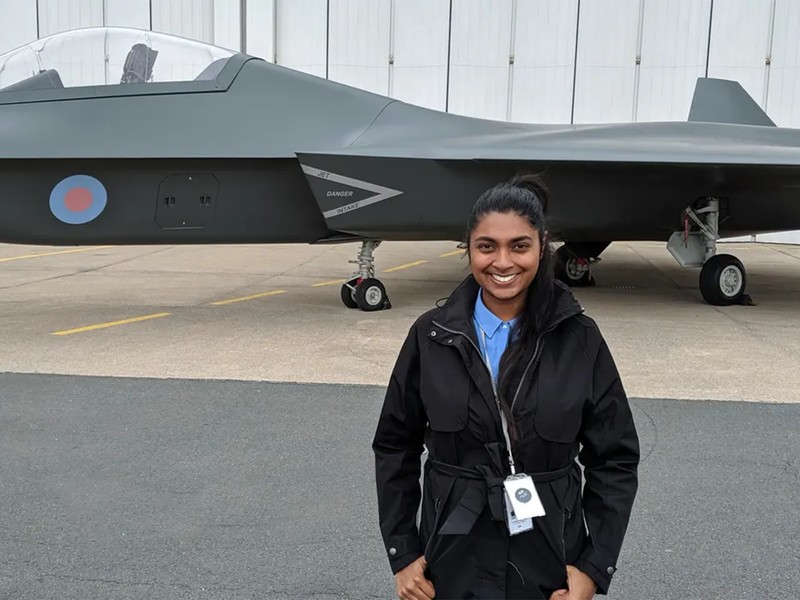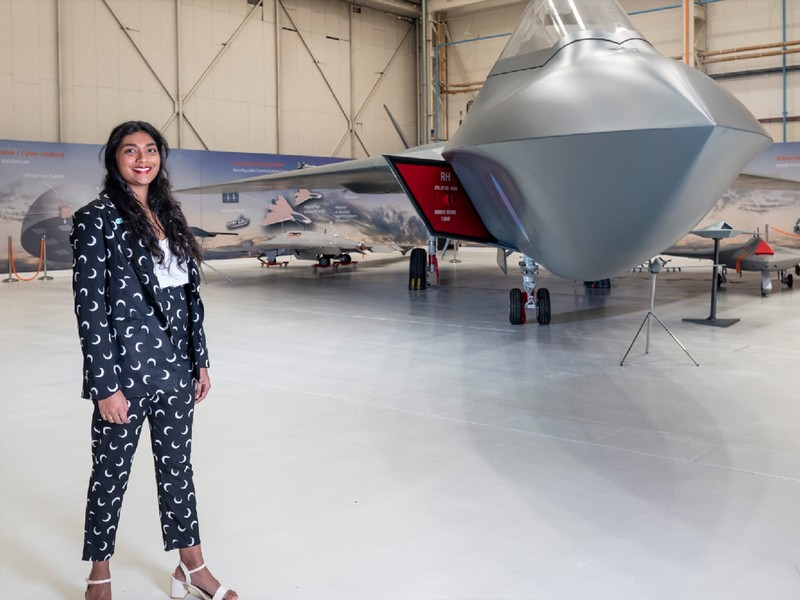11 Career Lessons From A Woman In Tech
Break Free From Family Expectation
I knew from a fairly young age that I wanted to work in aerospace engineering. In fact, it was at a visit to an air show that I first felt captivated by the fast jets. However, my family always wanted me to follow in my mum’s footsteps and become a pharmacist – at times I felt I should explore this. Ultimately, though, I trusted my gut and have never looked back. My parents now say it’s the best decision I ever made.
Don't Assume There's Only One Route In
It was during my time studying Aerospace Engineering that I first realised the extent of the gender disparity in STEM industries, and engineering more specifically. It isn’t just something I found in higher education, but throughout my career and still to this present day. In fact, women make up just 24% of STEM employees in the UK, with sectors such as engineering having a workforce that is just 11% female. On my course I was one of just two females in a class of over 30 people. I was shocked and a little intimidated at first, but it didn’t stop me or make me feel as if I didn’t belong. However, it did make me realise that to many people I don’t ‘look like an engineer’. I would encourage all young female students to follow their passion and dreams and to never be held back by stereotypes, stigmas or misconceptions – especially because STEM industries are still male dominated. I grew up feeling like I didn’t fit the mould, so my advice to female students now who might have the same concern to ignore it as STEM truly is for everyone of all backgrounds.
Be Aware Of The Gender Disparities
It was during my time studying Aerospace Engineering that I first realised the extent of the gender disparity in STEM industries, and engineering more specifically. It isn’t just something I found in higher education, but throughout my career and still to this present day. In fact, women make up just 24% of STEM employees in the UK, with sectors such as engineering having a workforce that is just 11% female. On my course I was one of just two females in a class of over 30 people. I was shocked and a little intimidated at first, but it didn’t stop me or make me feel as if I didn’t belong. However, it did make me realise that to many people I don’t ‘look like an engineer’. I would encourage all young female students to follow their passion and dreams and to never be held back by stereotypes, stigmas or misconceptions – especially because STEM industries are still male dominated. I grew up feeling like I didn’t fit the mould, so my advice to female students now who might have the same concern to ignore it as STEM truly is for everyone of all backgrounds.
Stand Up For Yourself & What You Believe In
I would also encourage female students to never let other people determine what you think you can’t do or what career you should get into. This is one of the main reasons why I wanted to become a STEM Ambassador – to encourage and inspire students to follow their dream career, no matter what industry. If you work hard and stay true to yourself, the benefits will follow. Throughout university and the early years of my career I had low confidence and wouldn’t speak up about any achievements or network outside of my comfort zone. This all changed for me after I came back from maternity leave. I achieved my professional registration, becoming a Chartered Engineer, a promotion to Senior Engineer, became a STEM Ambassador and began actively networking.
Trust Yourself & The Process
When I graduated from university, I had no industry experience as I hadn’t taken any placement years or networked to make industry contacts. This meant that I struggled initially to find my first job, but I persevered and got one working as a Technical Design Engineer on novel business and first class suites on passenger planes. Once I’d gained a few years of experience in my first role, I applied for a job as a Flight Systems Engineer at BAE Systems where I’ve spent the last eight years working on various programmes. My advice might sound clichéd, but always be yourself and trust in your own ability. So many people, especially women, doubt themselves when they don’t need to. Being nervous for new job interviews is understandable and often a good thing because it shows you care, however, it’s also possible to walk in there as your most confident self. Also, preparation is key; do your research on the role and the company to help you feel ready.


Look Up To The People Around You
Starting a new job can be daunting, but hopefully exciting in equal measure. It’s worth trying to learn as much as you can from your colleagues and don’t be afraid to ask plenty of questions. Another cliché, but there is no such thing as a silly question, especially if it’s your first job or a job in a new industry. Remember, no one is born a natural expert in their field, whether they are an engineer, chef, footballer, or pilot – those senior to you have been in a very similar position. To ensure I move forward, I also set clear time-based goals and lay out my plan of action to achieve those goals. Writing this into a development plan and sharing this with my management has helped them understand where I want to go and what areas I need to work on to get there. Some of the best career advice I’ve been given is to find a mentor, no matter what stage of your career you’re at.
Learn From Your Mistakes
Making mistakes or feeling like you have failed is never easy and it’s something everyone struggles with. I try to see setbacks as a way to learn. I don’t view these moments as failures but instead use them to benefit my career by asking for feedback or specific ways to improve. After all, everyone – no matter how junior, senior, or experienced they are – will have made mistakes before so don’t let the fear of making mistakes hold you back.
Silence The Doubts
Imposter syndrome is something I constantly suffer with. It held me back when I had low confidence in university and throughout my early career. What always helps me is evidence. I look back over my professional registration application and the work that I’ve done which helps me remember I am more than capable and deserve to be where I am. Many people, and not just women, experience imposter syndrome, but try to remember that every individual is valuable, and you have the ability and right to be in a career you’re passionate about.
Find The Balance Where You Can
Becoming a mother completely changed my career trajectory, in a positive way. I gained a lot of confidence which fed my passion to be the role model that I never had. Balancing a career and motherhood is certainly a challenge and something I know many parents struggle with. There is no right or wrong way to do it, it’s about finding what works for you and your family. It also takes a lot of organisation to ensure I make plenty of time for my personal life outside of work. I doubt it will ever be easy and there’s times where I have to pause and re-evaluate, but I have a strong support system in place and the ability to work flexibly – which makes the balance easier to achieve.
Make The Most Of Those ‘Lightbulb’ Moments
I had a lightbulb moment in lockdown and set up my own side business to help empower people of all backgrounds in STEM. I created my own ‘This Is What An Engineer Looks Like’ badge and decided to see whether there was demand out there by setting up a business on Etsy. I was astonished as the first 100 badges sold out within 48 hours and since then, the business has continued to thrive. To meet demand, I have since expanded my product offering and now offer 48 different types of badges, such as: ‘STEM Is For Everyone’ and ‘This Is What A Pilot Looks Like’. I I want the badges to help make a positive change in the way people perceive STEM careers, and as a result, hopefully encourage young people with an interest in these careers to follow their passion.
Be The Change You Want To See
My advice to busy women in science or tech-based jobs would be to continue doing what you love, and busting stereotypes about what it means to be working in a man’s industry – it’s what will help inspire young females coming up as part of the next generation. Although progress is slow, more and more women are pursuing engineering careers, so I have high hopes for the future.
Follow @AviateHer on Instagram & visit Etsy.com to shop now. Krystina is supporting STEM Learning’s flagship STEM Ambassador programme, on behalf of UK Research and Innovation. To find out more visit: STEM.org.uk/STEMAmbassadors.
DISCLAIMER: We endeavour to always credit the correct original source of every image we use. If you think a credit may be incorrect, please contact us at info@sheerluxe.com.


